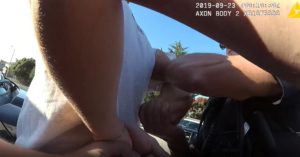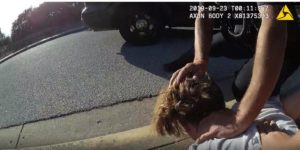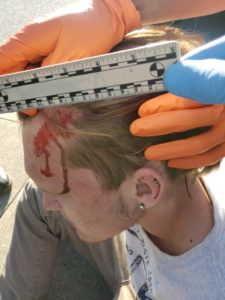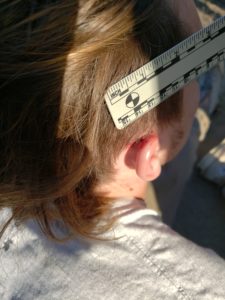Police Brutality Attorneys at Piccuta Law Group File Civil Rights Lawsuit Against CSUMB and City of Marina Police Officers
The Piccuta Law Group recently filed a new civil rights lawsuit alleging excessive force and police brutality. The lawsuit was filed against police officers from the City of Marina and California State University of Monterey Bay (“CSUMB”). The lawsuit alleges that two officers used excessive force when taking a distressed college student into custody. The lawsuit is pending in the Monterey County Superior Court. It is entitled Ebright v. California State University, Et Al. It is case #20-CV-002605 and pending before the Honorable Judge Thomas W. Wills.
The Facts Alleged by Our Police Brutality Lawyers
The civil rights lawsuit alleges that on September 22, 2019, Ebright was a confused and vulnerable college student who was suffering from a temporary mental health issue. Ebright himself called the police and requested medical aid. Police from CSUMB responded and made contact with Ebright. They found Ebright talking on his phone to his mother. Ebright’s mother was put on speakerphone and spoke to the officers about her concern for her son and his need for medical attention.
Ebright told the officers that he would like to go the hospital to get medical attention and water. Paramedics and an ambulance were dispatched to assist Ebright. The officers checked Ebright’s driver’s license and spent nearly 30 minutes with him as he remained confused and indecisive as to what he should do. Ebright ultimately declined all help as he was disoriented and paranoid.
Not long after this initial contact, Ebright’s mother called the police advising that Ebright’s phone had run out of battery and the she was concerned for his safety. Ebright’s mother requested a welfare check. City of Marina and CSUMB police officers were dispatched. This time, they found Ebright sitting on a sidewalk curb. Ebright had been wandering around alone. He was lost and looking for water and a phone charger.
The same police officers that responded to the initial call for Ebright were both present. Officers determined it was appropriate to frisk Ebright and to restrain him in the course of an investigatory stop. In doing so, the officers commanded Ebright to put his hands behind his back so that he could be handcuffed. Ebright was paranoid and apprehensive about being handcuffed. Officers applied a control hold on Ebright’s arms and forcefully tried to handcuff him. Ebright was not under arrest and was confused as to why they were using such force. Ebright attempted to pull away.

Ebright was then taken to the ground by multiple officers. While on the ground, Ebright was compliant and subdued. He asked the officers to relax. The officers responded by using physical force. The officers concussed Ebright by smashing his head into the sidewalk pavement. They also broke his hand. Ebright was transported to the emergency room by ambulance and treated for his injuries.
The Claims Asserted In the Monterey Civil Rights Lawsuit
Though Ebright ultimately pled no contest to a count of resisting, obstructing or delaying under Pen. Code § 148(a)(1), the force used by Defendants was significantly greater than what was required to make an arrest. The force was disproportionate to any threat posed by Ebright to the officers. Ebright’s initial pulling away from the officers can be construed as resisting arrest and arguably justified the officers taking Ebright to the ground. The same is not true for the additional force used on Ebright when he was on the ground. At that point, he had two officers on top of him, others standing nearby and was completely subdued. The injuries suffered stemmed from the excessive use of force by the officers once Ebright was on the ground.
The force was disproportionate to any threat posed by Ebright to the officers.
As such, our police brutality attorneys filed claims for violations of Ebright’s rights under the Fourth Amendment to the United States Constitution and article I, section 13 of the California Constitution. The civil rights lawsuit includes claims against the officers in their individual capacities under state law causes of action, including the Thomas Bane Civil Rights Act. Claims were brought against the City of Marina and the California State University for the conduct of their employees acting within the scope of their employment. The lawsuit also included claims for battery by a peace officer and intentional infliction of emotional distress.

The Actual Allegations Filed in the Civil Rights Lawsuit Claiming Police Brutality
Below are the actual allegations from the police brutality lawsuit our civil rights lawyers filed. They are taken word for word as they appear in the lawsuit:
- On September 22, 2019, Mr. Ebright was at a social gathering in Marina, California.
- Upon information and belief, Mr. Ebright unknowingly ingested a controlled substance while at the gathering. This caused him to become confused and paranoid, and so he left the event on his own.
- Shortly after, Mr. Ebright made a phone call for medical assistance for himself.
- At approximately 3:45 p.m., Defendant Prebula and his trainee, Officer Durrer, were dispatched to perform a welfare check on Mr. Ebright. They contacted Mr. Ebright on Manassa Dr., near Petersburg Ct., in Marina, California.
- Prebula conducted a pat-down search of Mr. Ebright, who was unarmed. Ebright ultimately declined a ride to the hospital. Prebula and Durrer then left the scene without incident.
- Later that day, Mr. Ebright’s cell phone battery life expired while he was speaking with his mother. Ebright’s mother then called for another welfare check of her son.
- Prebula and Durrer again responded to the call. They approached Mr. Ebright on Manassas Dr., near Wilderness Court, at approximately 5:00 p.m.
- Prebula requested assistance from the Marina Police Department. Defendant Cattaneo was in the area and responded to the scene.
- Upon arrival, Cattaneo approached Mr. Ebright, who was sitting on the curb. Cattaneo ordered Mr. Ebright to stand so that he could conduct another pat-down search of Mr. Ebright’s person for weapons.
- After Mr. Ebright stood to his feet, Cattaneo forcibly placed Mr. Ebright’s hands behind his back. At this time, Mr. Ebright was not under arrest.
- Because Mr. Ebright was not under arrest, he was confused as to the level of force employed by Cattaneo.
- Ebright believed that Cattaneo was using unlawful force, and so Mr. Ebright attempted to pull away and free himself.
- Cattaneo responded by wrapping his arms around Mr. Ebright from behind and slamming him into a patrol vehicle.
- Prebula and Cattaneo then seized Mr. Ebright’s arms, applied control holds and took Mr. Ebright to the ground, face-down onto the sidewalk pavement.
- While on the ground, Defendants broke Mr. Ebright’s right hand. They also smashed his head into the sidewalk on the way to, and while on, the ground.
- Ebright alleges upon information and belief that Cattaneo applied the force that broke Mr. Ebright’s hand, and that both officers forced Mr. Ebright’s head into the pavement.
- After he was taken to the ground, Mr. Ebright was compliant and was subdued by no fewer than three officers.
- Ebright was taken from the scene to the Natividad Emergency Department. There, he was diagnosed with a broken right hand, ankle pain and a laceration to his head. He was also later diagnosed with a concussion.
- Prebula and Cattaneo turned an investigatory stop into a violent altercation during which they concussed and broke the hand of a subdued and compliant individual who was suffering from a temporary mental health issue. This malicious conduct was despicable and was carried out with a willful and conscious disregard of Mr. Ebright’s rights. Further, this conduct was oppressive in that it was despicable and subjected Mr. Ebright to cruel and unjust hardship in conscious disregard of his rights.


The Damages that Can Be Recovered in A Police Brutality Lawsuit
In a civil rights lawsuit for police excessive force, an individual can recover both economic and non-economic damages. Economic damages may include:
- Amounts for past medical expenses
- Payments for lost time from work
- The cost of replacing property that was damaged
- Money for future medical expenses
- Compensation for any earning impairment
Earning impairment is the inability to earn as much money as one would have but for an injury. Here is an example. Someone was wrongfully shot by a police officer and paralyzed. Prior to being shot, that person earned a living as a mechanic. Now that person no longer can work as a mechanic. However, that person is able to work as a telephone operator or a telephone customer service representative. Assume, this is the highest paying job the paralyzed person can obtain with his or her education and background. The telephone job pays $30,000 per year. The mechanic job paid $60,000 per year. The person would be entitled to $30,000 per year in future lost earnings due to the earning impairment.
The non-economic damages that may be recovered in a police excessive force lawsuit include money for:
Past and future physical pain;
- Past and future mental suffering;
- Past and future loss of enjoyment of life;
- Past and future disfigurement;
- Past and future physical impairment;
- Past and future inconvenience;
- Past and future grief;
- Past and future anxiety;
- Past and future humiliation; and
- Past and future emotional distress.
Unlike economic damages, there is no exact formula for calculating non-economic damages. The decision on what to award in non-economic damages is left to the discretion of the jury. The amount a jury may award depends on the circumstances of the case, the jury selected, the way the case was presented, how likeable the victim is, how unlikeable the wrongdoer is, among other things.
Punitive damages are also recoverable in a police excessive force lawsuit. Punitive damages are damages that the jury may award to punish the wrongdoer. They are awarded to send a message and to discourage the wrongdoer from acting in the same way again in the future.
Attorney fees are recoverable in a police excessive force lawsuit. This means that the attorney for the victim may ask the court to award attorney fees if the victim wins the case. This is significant as it allows attorneys to prosecute civil rights violations even when the potential damages awarded to the victim may not be very high. This also benefits the victim because it provides additional funds from which the attorney may be compensated.
This is unlike a personal injury case. In typical personal injury cases, such as a car accident case, the attorney takes his fees from the amount awarded to the client. There are no additional funds provided to pay for attorney fees. However, civil rights cases allow for the recovery of attorney fees which ultimately means the client will receive more money.
Contact a Monterey Civil Rights Lawyer if You or a Loved One Experienced Police Brutality
If you or a loved one was the victim of police brutality, contact the Piccuta Law Group today for a free consultation. A skilled police brutality lawyer is available now to discuss your case. A consultation is free. If we take your case, it costs you nothing and we do not earn a fee unless we recover for you. Our firm has successfully handled civil rights cases involving police excessive force throughout California and Arizona. Our lawyers specialize in police brutality and law enforcement excessive force cases.
About the author: The content on this page was written by California civil rights lawyer and Monterey personal injury attorney Charles “Tony” Piccuta. Piccuta graduated with honors from Indiana University-Maurer School of Law in Bloomington, Indiana (Ranked Top 35 US News & World Report 2018). Piccuta took and passed the State bars of Arizona, California, Illinois and Nevada (all on the first try). He actively practices throughout California and Arizona. He is a winning trial attorney that regularly handles serious personal injury cases and civil rights lawsuits. He has obtained six and seven figure verdicts in both state and federal court. He has been recognized by Super Lawyers for six years straight. He is AV Rated by Martindale Hubble. He is a member of the Consumer Attorneys of California, American Association for Justice, National Police Accountability Project, Arizona Association of Justice, Maricopa County Bar Association and Scottsdale Bar Association, among other organizations.
Disclaimer: The information on this web site is attorney advertising and is for informational purposes only. It does not constitute legal advice. Reading and relying upon the content on this page does not create an attorney-client relationship. If you are seeking legal advice, you should contact our law firm for a free consultation and to discuss your specific case and issues.

